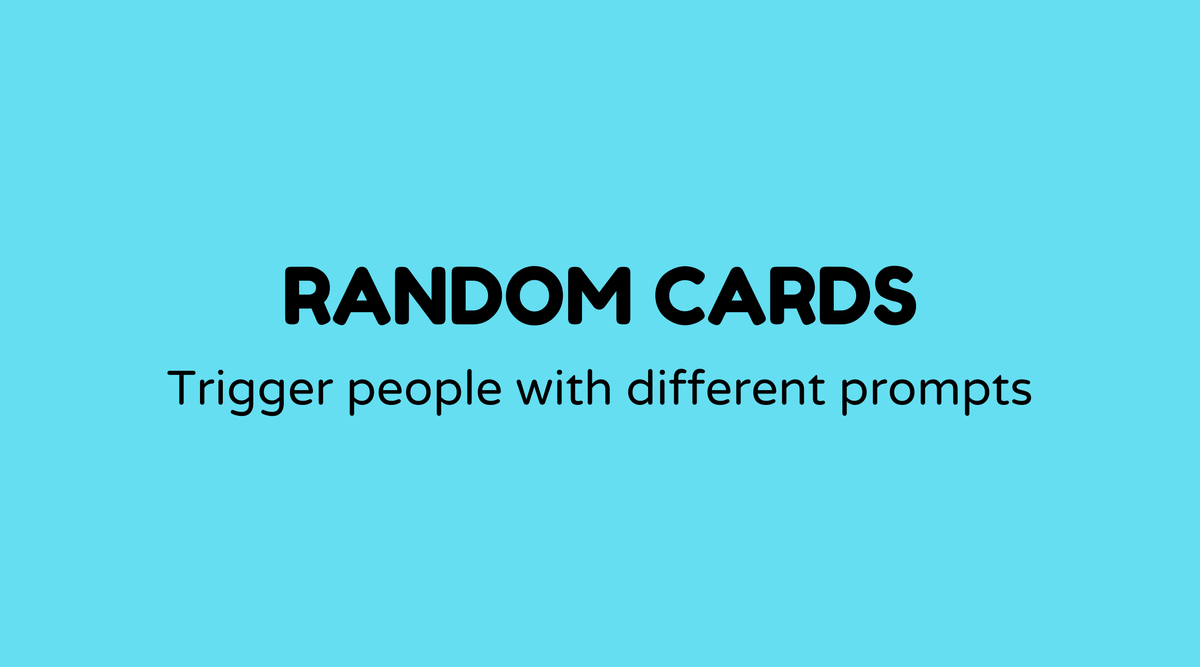Random Cards

Overview of Random Cards Workshop:
A Random Cards Workshop is an interactive format utilized in various environments to promote creative thought and problem-solving. The approach centers around the erratic selection of cards, each featuring a distinct prompt, idea, or challenge. Participants utilize these cards to inspire discussions, concepts, and solutions. It offers a fresh perspective on thinking creatively and can be implemented in team building, brainstorming sessions, or design processes.
Importance of the Random Cards Workshop:
We frequently hear the phrase "thinking outside the box," yet achieving that can be challenging. The Random Cards Workshop provides a solution. It helps spark creativity and introduces fresh viewpoints by incorporating an element of unpredictability. By employing this workshop, teams can set aside established biases and consider new paths for innovation. Moreover, it's an enjoyable and engaging method for bringing individuals together, enhancing collaboration and communication.
Defining the Random Cards Workshop:
At its essence, a Random Cards Workshop consists of participants drawing cards from a deck—typically custom-tailored for the specific context or challenge. These cards may encompass words, images, or prompts that appear unrelated to the current task. The objective is to inspire nontraditional thinking and unique solutions. The randomness of the cards breaks habitual thought patterns and encourages users to forge surprising and imaginative connections. Activities can vary widely, from icebreaker sessions in corporate settings to design sprints in tech enterprises.
Conducting a Random Cards Workshop:
Facilitating a Random Cards Workshop is straightforward and adaptable. Here’s a step-by-step guide:
-
Prepare the Cards:
- Create cards featuring diverse prompts, images, or keywords.
- Include a blend of familiar and abstract concepts to engage various aspects of creativity.
-
Set Clear Objectives:
- Identify what you intend to accomplish with the workshop.
- Ensure all participants understand the goals.
-
Brief the Participants:
- Clarify the process and objectives of the workshop.
- Encourage an open-minded and exploratory mindset.
-
Draw and Reflect:
- Participants randomly draw cards.
- Provide time for contemplation on how the card relates to the issue or project at hand.
-
Discuss and Ideate:
- Facilitate group discussions or individual brainstorming sessions based on the card’s inspiration.
- Record all ideas, regardless of how unconventional they appear.
-
Develop and Execute:
- Select the most promising ideas and brainstorm potential execution strategies.
- Create a timeline and assign responsibilities if needed.
Examples of Random Cards Workshops:
- Corporate Innovation Sessions: Organizations like IDEO utilize this method for team ideation and design thinking processes.
- Educational Settings: Educators use it to enhance creative writing and problem-solving abilities.
- Personal Development Retreats: Individuals apply it for self-reflection and overcoming mental obstacles.
FAQs
Why utilize a Random Cards Workshop?
- It promotes divergent thinking and introduces a fresh approach to problem-solving.
What types of prompts suit the cards?
- A variety of prompts ranging from abstract images, single words, or thought-provoking questions work well.
How long should the workshop last?
- Typically, it can run from a couple of hours to a full day, depending on the depth of the challenge.
Can it work in remote settings?
- Yes, digital versions of the cards can facilitate virtual workshops.
What are the benefits of such a workshop?
- It encourages creativity, improves team cooperation, and can lead to innovative ideas.
Are there specific tools recommended for conducting this workshop?
- Tools like Mural or Miro for remote brainstorming or simply printed cards and whiteboards for in-person gatherings.



